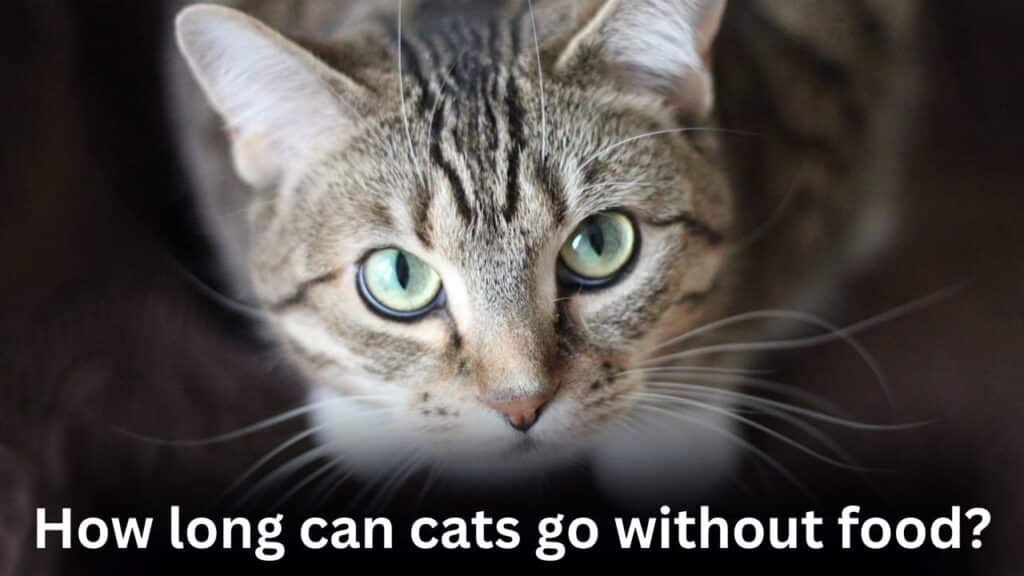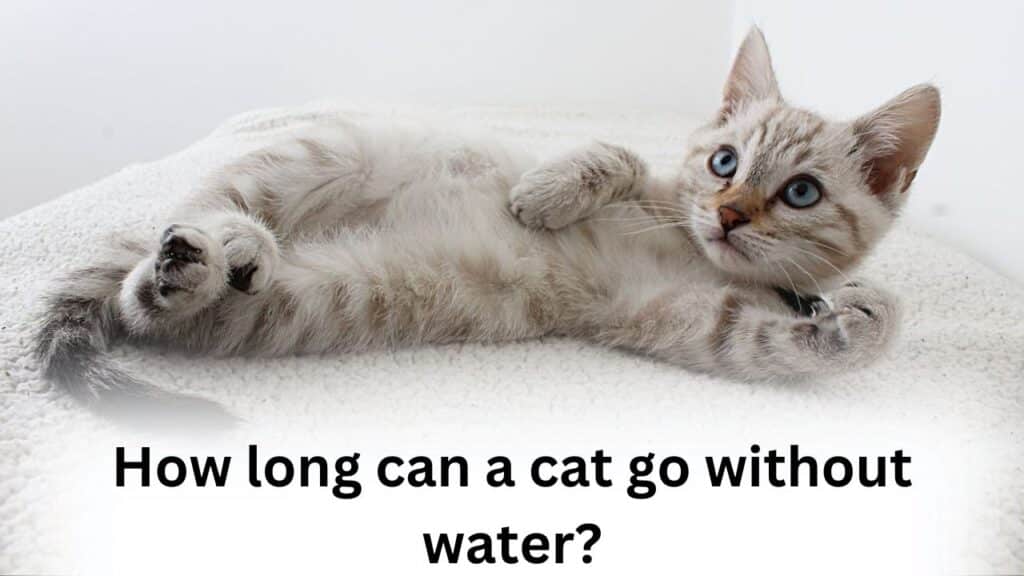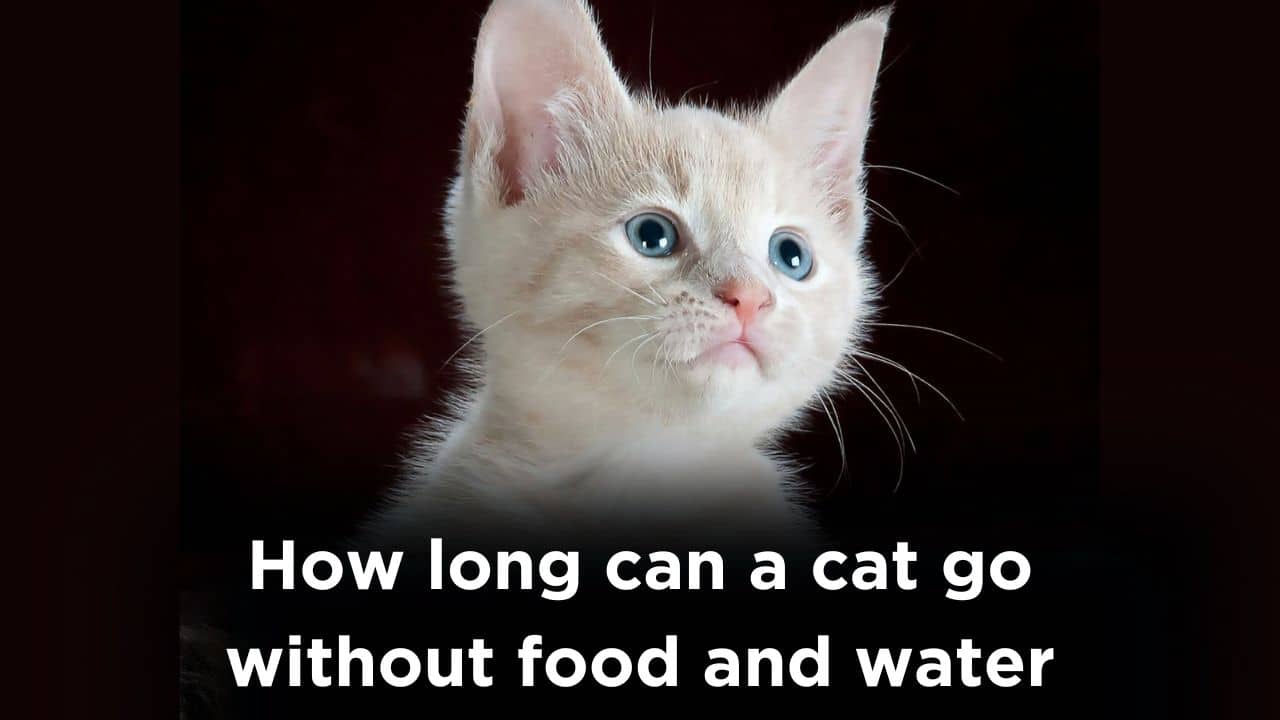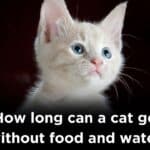The possibility of a cat go without food and water for a certain period and firstly controlled by factors like age, health conditions, location, and weather would vary. Whether cats experience starvation is not always constant; cats only have one meal per day and she might not have eaten for almost two weeks. This, however, may be a problem, since they can become dehydrated faster than their ancestors. Poor water supply poses a dire threat. Without much water, a cat only survives for 3 to 4 days.
It’s very important to ensure that cats will always have a break from old water and they must be always given a daily meal to keep them healthy and happy. Whether a cat has lost or refuses to take the food it’s highly advisable to ask for help and advice of a vet, because this may be a signal that some other health problem is already present that has to be solved.
How long can cats go without food?

The survival capability of cats go without food depends on a number of circumstances such as age, health status, and environmental conditions. On average, a healthy adult cat can cope with hunger by not eating for three to seven days. On the other hand, it hugely depends on the personal case whether the situation will occur faster or not.
Cat’s ability to fast will be impacted by various factors
Cats are adept at prey capture and surviving in the wild; although, domesticated kitties could be likely to succumb to emaciation caused by different variables.
Age and Health Status
Like young kittens or very old or extremely sick cats, they are trying to cope with limited resources. Kittens should be fed small portions of food every few hours to meet with their enormous appetite.
Cat’s Body Features Indications of Starvation
Spotting signs of starvation in cats is a very important factor that could help provide them with timely and proper care.
Physical Signs of cats go without food?
- Weight loss
- Lethargy
- Weakness
- Sunken eyes
How long can a cat go without water?

In terms of cats, cats go without water for about 3 to 4 days in most cases, but it might differ at times depending on their general health, age, and conditions of the environment.
Yet on the other hand, dehydration can set in at a much faster pace than starvation and may lead to severe health problems such as kidney damage, organ dysfunction, and so on. Fresh water should be available as needed by your cat at all times to ensure their good health.
The Importance of Water for Cats
Water is important for preserving the correct kidney function, keeping urinary tract infections from developing, and backing up hydration overall. Having no appropriate amount of water for cats, they tend to become more severely dehydrated, presenting with serious health problems rapidly.
Differing procedures of Cats-specific Water Intake
Cats have urinary systems that do not lose water as they have a very efficient method of concentrating and holding water as much as possible But with the adaptation to the dependency of their water need on the moisture in the food, there is a possibility that cats may not even feel thirsty until they are already dehydrated. Therefore, this calls for taking a US judgment of regular intake of water and keeping a close vigil on cats’ hydration levels.
Factors Affecting Feline Hydration
It may depend on multiple components, such as cat’s age or health status. Knowing the underlying reasons for a pet’s dehydration is a huge part of improved hydration.
Age and Health Status
Senior cats as well as the kitties that have health conditions are the ones that are likely to develop dehydration. Similarly, diabetic or kidney cats require diligent monitoring and dehydration prevention to ensure that they drink enough.
Environmental Conditions
Extreme summer temperatures, dry pitches, and indoor heating can escalate a cat’s degree of water demand. In the face of heat waves or periods with low humidity, watering kept on a constant refreshment could be done via fountains.
Diet
Cat food could potentially affect the extent the cat would be hydrated. Cat dry food contains less water than the wet equivalents which therefore have to be compensated with extra water in food quantity. Water in the case of your cat, has always been more closely related to feeding. Encouraging your cat to consume wet food or adding water to dry kibble can help in increasing overall water intake.
Dehydration Visible Symptoms of a cat go without water?
Being able to detect the symptoms of dehydration is important because it enables the right preventive interventions. Common symptoms include:
- Decreased Urination: The incidence of the lesser and irregular voiding of the urine.
- Dry or Sticky Gums: As for dehydrated cats it may have to do with them having dry gums or gums that stick to the lower jaw.
- Lethargy: Loss of energy or excitement of a daily chosen activity.
- Sunken Eyes: Dehydration can lead to the eyes looking as if they have a sunken quality or a unanimous color.
- Skin Elasticity: Another skin building block that is destroyed in the process of dehydration is elasticity. Subtly try to sensate your kitten’s skin by moving your hand over the skin; if the skin does not come back into position immediately, dehydration can be the cause.
Conclusion about a cat go without food and water
The capacity of a cat to go without food and water should be realized, knowledge of which is crucial for responsible pet ownership. They might demonstrate superb survival tendencies, but immediate intervention and veterinary care remain of utmost importance in emergency cases so as to see them through in good stead. if you have any questions about related cats, please leave your comments in the comment section, Thank you for visiting www.meowmenu.com.
FAQs: Does a cat go without food and water? and more
How long can a cat go without eating food?
Cats, in most cases, can withstand a period of fasting between 1 to 2 weeks; this can vary when several factors such as health status, age, and prevailing environmental conditions are factored in. Yet, it is of the supreme significance to pay close attention to the condition of those athlete who have not eaten for longer than 24-48 hours, as insufficient dietary intake in non-runner for a longer period may cause serious health problems.
How long can a cat go without pooping?
Cats usually need to pass feces at the least every day. Though, therefore, e exact length of time between meowing and pooping can change owing to the consideration such as nutrition, water consumption, and overall state of health. If a cat is deprived of pooping for 2-3 days in a row without pooping, it is high time for seeking medical advice as there could be an underlying health problem such as lack of appetite or blockage in the intestines.
How long can a cat go without peeing?
Cats are safe, on average, to urinate once a day. They must limit their time without voiding of the stool at 24 hours max. If a cat will not get rid of urine for more than 24 hours, such behavior may be of alarming character and it is a perfect reason to go to a specialist as soon as possible.
How long can a cat go without urinating?
Cats should not relieve themselves from holding the urine longer than 24 hours. When the cat has not peed for atleast a day it is the significant indicator of a potential health complication and this immediately merits a veterinary attention.
How many days can cats go without food?
Cats can probably about 1-2 weeks without food under conditions that are favorable with him, which is influenced by his health, mitochondrial function and environment conditions. Conversely, it’s vital to keep in mind that an individual in HSW should be monitored closely for the duration of the fast that if it lasts constant enough, for example, 24-48 hours, there’s a risk of severe health issues.

